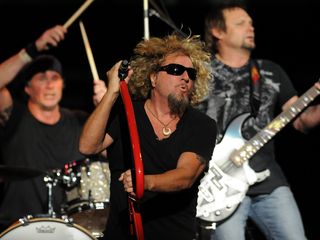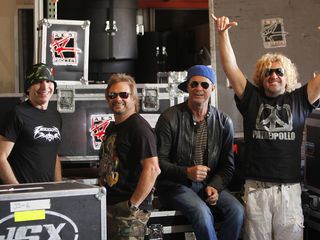

Joe Satriani gives us the scoop on the new Chickenfoot album, due this fall. © Gene Ambo ./Retna Ltd./Corbis
By rock star standards, Joe Satriani should be kicking back right about now: In the past two years, he and the rest of Chickenfoot (singer Sammy Hagar, bassist Michael Anthony and drummer Chad Smith) released their debut album and toured extensively. In addition, the guitar icon took part in last year's spring run of the Experience Hendrix tour. And if that weren't enough, Satch issued one of his finest solo efforts yet, Black Swans And Wormhole Wizards. More road work followed.
Time for a breather, right? Wrong. Satriani is deep in the midst of the new Chickenfoot album, the all-important sophomore release. "The pressure's on, I guess," he says softly, not sounding like he's under any pressure whatsoever. "We're making this record very quickly. Our debut album was also recorded quickly, but as a group we did it in stages. We couldn't do that this time.
"I finished my Black Swans tour, knowing that we would have Chad for only a certain amount of time because of the Chili Peppers. So we had to meet up and blast through the tracks, which resulted in a terrific amount of energy and enthusiasm. It's like we were bottled up for so long, just waiting and waiting to get together to make this record. This isn't going to be a laid-back album by any means. It kicks pretty hard."
MusicRadar sat down with Satriani yesterday for an exclusive and in-depth update on the recording of Chickenfoot's next album, one which the guitarist says will beat the band's first CD "by miles." Improved sonics, bravura performances, mature songwriting - in Satriani's view, it's got it all. It also boasts the kind of title (tentative, we should stress) that is true to the Chickenfoot spirit. "It's crazy, I know," Satriani says with a laugh. "But why would anybody expect a normal album title from us?"
At what stage are you with the album? Have you finished tracking?
"Last week, we finished 99 percent of the drums, bass and guitars. Because we're not always in the same room together - or the same town - there's always a little bit of hesitation of where to go with the finishing touches. In this particular case, Sammy and I have been watching each other as to how we're developing our parts over what the entire band did when they were together. So the songs are still developing lyrically and vocally, and I don't want to commit 100 percent what the guitars will do until I hear Sammy's finished vocals.
Get the MusicRadar Newsletter
Want all the hottest music and gear news, reviews, deals, features and more, direct to your inbox? Sign up here.
"We're at a very exciting point in the development of the record. I think I can definitively say that the album sounds heavier and that it sounds like Chickenfoot. [laughs] I can't say too much about the lyrical aspect because I haven't heard everything Sammy's going to do - he wanted to come back from the book tour he's on before he made up his mind on a couple of songs.
"But I can tell you right now that the sound of the album is tremendous. The guitars are out of this world, and we haven't even done the real mixes yet."
You're co-producing with Mike Fraser, whom you've worked with in the past. What's the experience been like?
"Working with Mike is tremendous. He's a fantastic engineer and producer. I mean, imagine co-producing an album when your partners are Michael Anthony, Chad Smith, Sammy Hagar and me. That's almost unthinkable! [laughs] Everybody's got an opinion, and everybody speaks up loud and clear - probably too loud and clear, and all at once. But Mike is unflappable. He's very supportive, and he has great alternative ideas when they're needed.
"Mike is also very good at handling the way we seem to make records. We're dealing with demos via e-mail that we send around for months, and then, when we do get together, in less than 10 days we record the basic tracks of what is going to be an album. So there isn't a whole lot of development time."

Satch calls the band "a freight train going a million miles an hour." © Scott Harrison ./Retna Ltd./Corbis
"We don't test out the songs live, and we don't play them for weeks on end in the studio. We have, like, one day to get two songs down. So what happens is, everybody's attention and energy gets ratcheted up. But it's good because it helps us focus. We want to make this album a big leap in what is Chickenfoot, and Mike's been incredible in the whole process."
You recorded everything in Sammy's studio, The Foot Locker. How did that work out?
"The studio itself has been radically changed. [longtime Satriani engineer and co-producer] John Cuniberti redesigned the control room, everything from the wall treatments to all the gear. He created a whole new environment, and I just love it. Now you can go in and know that everything's right, and every piece of gear is going to sound great.
"The outside room didn't need that much work. John had suggested movable sound absorption, depending on how wet or dry we wanted to get the stuff. But in the end, Sammy's curtains and certain spots in the room ended up making everything sound OK.
"The difference this time was that Sammy wound up singing in what used to be my guitar room, and he gave me his vocal booth, which allowed me to stay in a room where I could be isolated from the drums. This was a problem with the first record when I would be standing in a room with Chad. He's so loud when he plays that he overpowers my headphones. The guy just puts everything into what he does, which is great, but after about an hour, I can't tell what my guitar sounds like - all I hear are drums and cymbals!" [laughs]
"Then we ended up putting my amps in the first area of the warehouse, which is where Sammy keeps all of his road cases and things. John and Mike Fraser built a little isolation room in there to mic the amps. After Chad was finished and left, we moved the guitar amps back into the main control room. A lot of moving things around goes on."
The piano song that became a guitar song
Last year, you and Sammy spoke very highly of a new song called Come Closer. It was going to be the first time that you wrote music to his pre-existing lyrics. And you wrote the music on piano, too. How did it come out?
"It came out beautifully, I think. I've always loved Sammy's ability to write down words and sing quietly and in a lower register. Believe it or not, he does do that! [laughs] We'll be in a restaurant or in a plane, and he'll just be singing ideas - and a lot of times, they're not in that big-time Sammy voice. He's not always singing Why Can't This Be Love. I was intrigued by that side of Sammy, and when he sent me these lyrics, I went, 'Wow! This is a really mature song.'
"I did write the music on the piano. I woke up one morning, made a cup of coffee, sat down at the piano and came up with what I thought would work. I recorded it on my iPhone, singing badly but trying to capture what I thought the melody should be. And Sammy loved it! He was crazy about it. In fact, when we all got together, it was the first song Sammy wanted to work on.
"In making it a Chickenfoot song, though, I had to play it on the guitar. I can't play piano well enough without making mistakes. But we kept the overall vibe. Mike and Chad came up with a really cool rhythm and groove. It's dark and mysterious, kind of like Radiohead and Tom Waits, but Sammy does put a bit of hope in there. We sort of amplified certain elements of it to make it sound like Chickenfoot. I'm really proud of it."

Hagar gets bluesy on the new Chickenfoot CD © Tim Mosenfelder/Corbis
Sammy was raving to me about a couple of acoustic blues numbers you had written. He said he was going to listen to Robert Johnson to get in the proper spirit to sing them.
"Yeah, that surprised me. All I did was lean in front of my laptop and record these four short acoustic guitar ideas, and then I sent them out to everybody. I figured they'd be catalysts for other ideas. Everybody showed up with their favorites from what I had recorded.
"There was a song I wrote called Setting Sun, and everyone was like, 'Let's do it now, let's do it now!' So I pulled out my [Ibanez] JSA 12-string, and of course, it was broken - somehow, it broke on the way to the studio. Sammy went up to the warehouse and pulled out this Ovation 12-string, which probably hadn't had its strings changed in 15 years or so. But Mike Fraser worked on it, got it in tune, and the next thing you know I'm recording this song with a beat-up old Ovation that nobody's touched in ages! [laughs]
"The whole thing was done on the fly, but it sounds good. It's me playing this acoustic blues on the 12-string, and then the rest of the band joins in. Eventually, I put some banjo on it. And Mike and Sam's vocals are fantastic. They sound as though The Eagles and Crosby, Stills and Nash suddenly ran into Chickenfoot."
When you guys got back together in the studio, how long did it take to fall into a groove?
"Not long at all. Generally, once Chad sits down, we pick up where we left off. I don't want to say everything's comfortable and familiar, because there's always a newness to what we do. At times, it does feel like a freight train going a million miles an hour - if there is such a thing. [laughs] To me, the band has so much going on that it could burst apart at any given moment - and that's what makes it exciting."
Time for a guitar revolution
Guitar-wise, have you found yourself doing anything new or different than on previous albums?
"You know, I've been doing a weird thing on this record in that I've been working song for song, and I haven't been listening to everything we've done every day. I haven't been driving around in my car and pouring over all of the rough mixes. I decided that I should work on a song-by-song basis, and with each new song I free myself of the previous one.
"I can tell you, though, that my approach to the rhythm guitar structures and how the solos relate to the songs has been a real evolution. We've had so much better control of the sounds, which has been great. We've had the same guitar setup on this record, whereas, on the first album, I think I had four different setups. Plus, this time I'm using a JVM410 that I totally love."
I was going to ask you about amps. Now, on the last record you used some Peaveys. But on this album, you're using Marshalls, is that right?
"On the last record, there was the live Peavey stuff, some prototypes, some Marshalls, Fenders, the Wizard…A lot of it was pieced together. Soap On A Rope had my live Peavey half-stack recording where the amp was in the room. I really wished I could've redone it, but that's just the way it went down."

Satriani on stage with Michael Anthony in 2010. "There's always a newness to what we do." © Tim Mosenfelder/Corbis
"We had to do a lot of things where I would double my Ibanez guitar through the Peavey setup on the left channel, and on the right there'd be a '55 Les Paul through a Marshall. It wasn't the optimal way to work for me. What I really wanted to do was have my JS1000 through an amp of my choice and double-track it properly.
"This time around, we've been able to do that with discreet recordings of the guitar. As a result, everything sounds thicker and tighter; the guitar sounds make more sense in relation to the drums because they're not haphazardly recorded live setups. They're proper setups for recording an album. Ninety-nine perfect of the guitar sound is a JVM410 that's been modified by Santiago Alverez. It's a really thick, robust, versatile amp. It has four channels and three modes, all of which we've been using.
"I've been using mostly Ibanez guitars, but there is the odd 335 or Telecaster for some flavor. But we run everything through the same amp. I think the only other amps we've used are a Wizard head and an old '59 Fender Twin. I'll tell you, it's been great to record with a set of tools I can feel good about. The results will definitely be heard.
"In fact, Sammy called me the other day from the road - he's off on his book tour, I think he was in Toronto - and he'd just heard some of the rough mixes that Mike Fraser did. He told me, 'I can now finally hear the Joe Satriani that's on those solo records in Chickenfoot. On the first record you sounded different; this time, you sound like you.' He was talking about a particular guitar intensity as well as the sound. He felt really good about it, and I was happy to hear him sounding so positive."
Has there been any more news as to Chad's involvement in touring? Is it pretty certain that he'll be playing with the Chili Peppers when Chickenfoot hits the road?
"I don't really know. I haven't even bothered to get involved with speculating about that. I'm pretty good at waking up in the morning and saying, 'I will think about this today, and I will not think about that.' [laughs] And Chad's thing…it was too disruptive to consider. I just concentrated on the fact that Chad is the drummer in Chickenfoot, he's the drummer on the album, he's playng great, and my role is to play the guitar as best as I can.
"Once the record is done, I'm sure we'll go out to dinner and Chad will tell us what is happening. The Chickenfoot album will come out in the fall, we know we'll tour, and we know that Sammy, Mike and myself will be there. Like I said, Chad is the drummer in Chickenfoot, and anybody else who shows up will be temporary for live shows."
I understand that Sammy recently revealed the title of the record: Chickenfoot IV. What's the story there?

Chickenfoot: All for one and one for...IV?! © Michael Macor/San Francisco Chronicle/Corbis
[laughs] I have no idea! They were fooling around with that. I just remember being in the studio, in my booth, trying out some things. We had an entire 3-D film crew in our faces the entire day. So I'm trying to work something out, and Carter [John Carter, who co-manages the band with Mick Brigden] comes up to me and says, 'You love the title, right?' And I'm like, 'What title?' And he goes, 'Four.' I had no idea what was happening at the time.
"But it's sort of like the way we were called Chickenfoot: Somebody comes up with it, somebody else gets excited, and there you go - suddenly, we're Chickenfoot. I'm actually a firm believer that it doesn't matter what a record is called. I listen to so much music, and most of the time I don't even know what albums the songs are from. The big thing to me is seeing other people's enthusiasm. If the other guys are excited about calling it Chickenfoot IV, that's great.
"See, you're actually interviewing the other Joe Satriani right now. The Joe who's in Chickenfoot doesn't obsess over certain things. The Joe who puts out solo albums does. I'll think about album titles for weeks and months. In Chickenfoot, because it's not all about me, I want an album title that has Sammy and Chad and Mike laughing. That's what it's all about."
Last question. And guess what? It's about Sammy again! [Satriani laughs] Have your read his autobiography, and if so, what do you think of it?
"I have. I have read it, and I love it. It has really helped me understand this guy that I thought I knew. To me, the first part of the book is the most important part. His early life, where he came from, all the things he had to overcome - it explained so much to me about this wild, passionate guy that I've shared so many stages with. But I really do understand him now. He's the quintessential American story, the guy who came from almost nothing and persevered through so many failures to get where he is today.
"I know people will dwell on and be fascinated by the Van Halen sections of the book. I could care less about that. I think everybody knows all that stuff anyway. It's the sections of the book where Sammy really tells his story and his struggles…I think anybody who is going through some tough times and needs some inspiration should read it. He's been through a lot."
Joe is a freelance journalist who has, over the past few decades, interviewed hundreds of guitarists for Guitar World, Guitar Player, MusicRadar and Classic Rock. He is also a former editor of Guitar World, contributing writer for Guitar Aficionado and VP of A&R for Island Records. He’s an enthusiastic guitarist, but he’s nowhere near the likes of the people he interviews. Surprisingly, his skills are more suited to the drums. If you need a drummer for your Beatles tribute band, look him up.

"It may have bothered him that people didn’t recognise his guitar virtuosity, which might be why the song devotes so much space to his shredding": A music professor breaks down the theory behind Prince's When Doves Cry

“It didn’t even represent what we were doing. Even the guitar solo has no business being in that song”: Gwen Stefani on the No Doubt song that “changed everything” after it became their biggest hit
Most Popular








